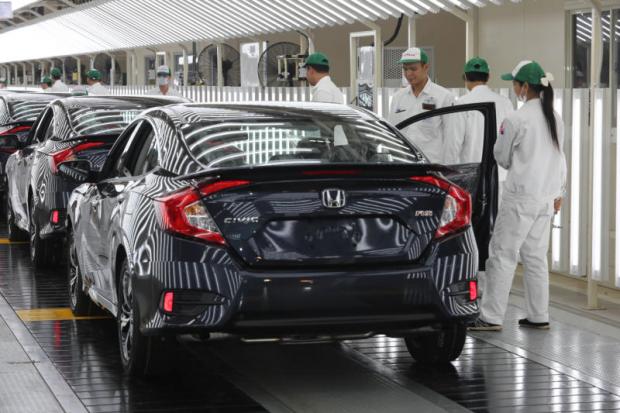
Honda Automobile Thailand aims for a 5% rise in local sales in 2019 after a mixed performance this year.
The Japanese car maker ranks third in Thai sales after Toyota and Isuzu.
Honda captured a 12.5% market share in the first 10 months with 103,902 units sold, up 0.9% from the same period last year.
Sales of sedans and hatchbacks grew by 2.1% to 78,306 units for the period, but SUV sales fell by 2.5% to 25,596 units.
Natt Patipanthada, general manager for marketing and strategic planning, said Honda expects to reach 128,000 cars sold throughout 2018, roughly equal to last year's showing of 127,768 units, which was up 19% from 2016.
The overall car market for January to October totalled 833,515 units sold, up 20.9%, meaning Honda saw less growth compared with peers in the mass-market segment.
"Honda is satisfied with the 10-month performance because the car brand had no all-new model launched this year," Mr Natt said. "Although the SUV segment had fierce competition from new players this year, Honda is confident of making up the largest market share in the segment once again."
He said the 2019 target of 5% sales growth is in line with the local car market's pace to exceed 1 million units sold.
Chief operating officer Pitak Pruittisarikorn said the car market has recovered to a normal situation since 2017, so sales volume of over 1 million units would reflect natural growth based on many positive factors in the country.
The situation differs from when the market was propelled by the first-time car buyer scheme, which led to sales of 1.45 million in 2012 and 1.33 million in 2013.
"So, the current growth in the Thai market is now steady and healthy," Mr Pitak said.
He said the economy faces some unpredictable factors from global circumstances, such as the trade war between the US and China and the fast movement of currencies, which will pressure Thailand's GDP and exports.
For Honda's car exports from Thailand, Mr Pitak said global sentiment has yet to have much of an impact on the car maker's shipments, forecast to reach 100,000 units in 2018.
In 2017, Honda was the fifth-largest exporter from Thailand with 89,530 cars, up 1%, while Thailand's overall car shipments fell by 4% to 1.14 million units.
"Honda's car shipments are doing very well, though it still faces a car-inspection obstacle at the port for exports to Vietnam," Mr Pitak said, adding that Honda is still trying to make shipments to that country.
Separately, Mr Pitak said that Honda will implement its programme for hybrid electric vehicles from 2019 and that its application for privileges can be allocated to two existing plants in Ayutthaya and Prachin Buri.
On July 25, Honda was approved for government incentives worth 5.82 billion baht.
Mr Pitak said the Accord sedan will be the first model to come in the hybrid version under the government's scheme, but Honda has produced this hybrid sedan for the past several years, gaining limited sales.
"The Thai-made Accord will be introduced in the first quarter next year," he said. "Honda will produce the hybrid version for every model sold in Thailand in the future."
Mr Pitak said the excise tax discount will narrow retail prices compared with internal combustion cars, so the hybrid segment will become more affordable for Thai buyers and enable the segment to expand significantly under the scheme.